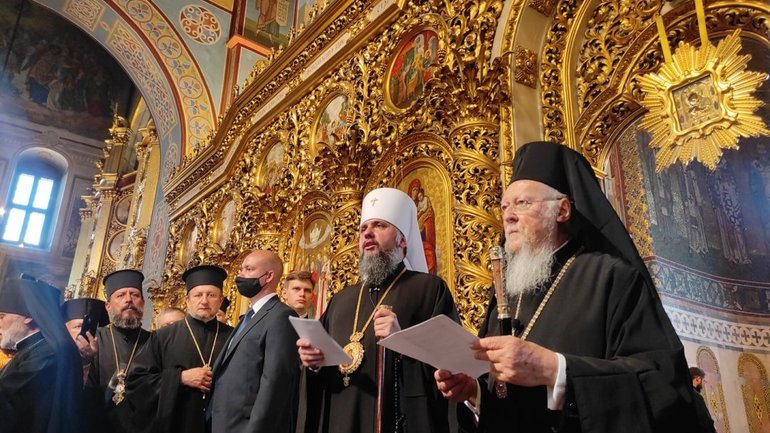Patriarch Bartholomew: We never assimilated the peoples to whom we came with the Gospel

This was stated by the first hierarch today in St. Michael's Golden-Domed Cathedral after the doxology.
"We have all come to live with you personally a miracle worthy of praise: the miracle of Resurrection, the struggle for the healing of division, the return to the communion of the Church, the unchecked following together on the path of truth.
We have arrived to see with our own eyes the achievements of many of your ineffable efforts, our Blessed Brother," Patriarch Bartholomew told Metropolitan Epifaniy.
He recalled that the Kyiv Metropolia was a canonical territory and a Metropolitanate of the Ecumenical Patriarchate.
However, the Church of Constantinople is a loving mother not only for Ukraine but also for Russia, Serbia, Romania, Bulgaria, Greece, Poland, Albania, the Czech Republic and Slovakia and all new churches.
In the past, various controversial issues have arisen between the churches, but, as the Patriarch noted, the Church of Constantinople always follows "the path of forgiveness, charity and healing of all its children without exception."
According to him, forgiveness is the privilege of the Great Church. The privilege of sacrifice, from which both the primacy of exhaustion and the duty of sacrificial service flow.
"The Ecumenical Patriarchate was initially a reliable guardian of the good of the church," he stressed.
Patriarch Bartholomew also noted that the Church of Constantinople once had ample opportunities, but it did not use them.
"Although at the time of its heyday and numerical strength (the Ecumenical Patriarchate - RISU) could have introduced and established a pyramidal form of the structure of the Eastern Orthodox Church, it rejected this idea with disgust and did not deviate an iota from the ecclesiology it inherited," Bartholomew said.
The Church of Constantinople, unlike others, never tried to assimilate the peoples to whom it came with the Gospel.
"And, of course, the Ecumenical Patriarchate has never, using the existing imperial power, chosen the path of cultural and linguistic assimilation of nationalities that led the Gospel to faith. On the contrary, the Great Church adopted local customs, the language spoken by people. It inspired and cultivated, contributed to the development of local culture so much that today it is impossible to imagine what the fate of those peoples who converted to Christianity would have been without the cultural influence of the Orthodox Church," Patriarch Bartholomew stressed.









